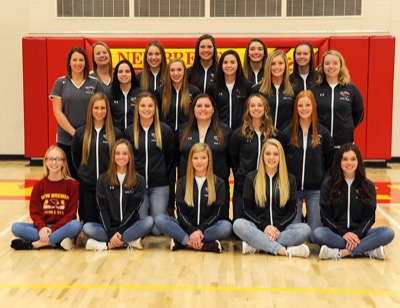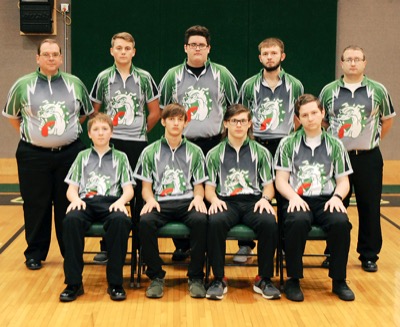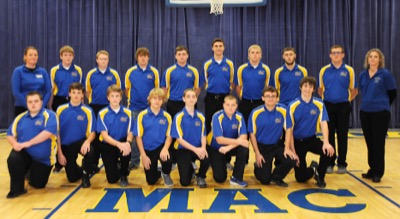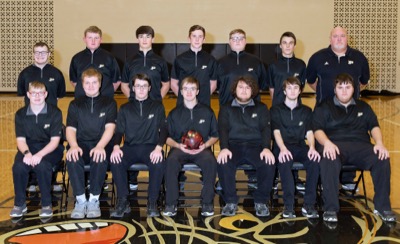Monday, November 19th, 2018
What's the buzz?
Stucke named state Beekeeper of Year
By Tom Stankard
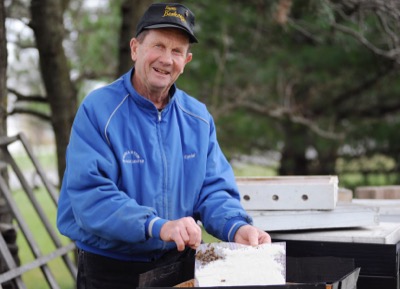
Photo by Dan Melograna/The Daily Standard
Ron Stucke lifts up a small screen with bees eating fondant recently at his home in Maria Stein.
MARIA STEIN - Beekeeper Ron Stucke said he started harvesting honey 30 years ago because the gooey nectar "is one of life's greatest rewards."
His dedication to keeping bees alive and desire to spread awareness about his favorite flying insect has earned him the title "Beekeeper of the Year" from the Ohio State Beekeeper's Association. Three people wrote letters of recommendation to net him a nomination. Each described Stucke as "passionate," his wife, Carolyn, said.
While his dedication is unwavering, his hives' production depends upon conditions beyond his control. The amount of honey he collects and sells to his friends every year depends upon the number of bees in his eight backyard hives.
"One year I collected 250 gallons. Last year, I had 94, and this year I had about 20," he said.
The loss of honey is due to the decline of the bee population from the loss of habitat, bee-killing pesticides and disease-carrying Vorroa mites, Stucke noted.
More people are becoming beekeepers to battle the population decline, Stucke said. He encourages people to grow pollinator habitats to lure bees to the area. Pollinators such as bees have two basic habitat needs: a diversity of native flowering plants and egg-laying or nesting sites, according to the U.S. Department of Agriculture.
Beekeeping in Ohio presents an additional challenge - keeping the insects alive through the winter, Stucke said.
"Hopefully, in the spring they're still alive. I lost just about all of them last year in the winter," he said. "A lot of beekeepers lose 40-60 percent of them. Some years are worse than others."
Stucke takes measures to help the hives survive the winter. He has installed an exterior layer of insulation that keeps the hives 8 degrees warmer. For sustenance, he feeds the bees fondant, a thick paste of sugar and water, and pollen patties for nutrition beyond the honey they normally consume.
Bees bred in colder climates have a better chance of survival, he said, noting lots of bees are brought up from the South and don't adapt well to the cold.
Inside the hive, bees have different responsibilities, Stucke pointed out. The sole queen is the only fertile female bee in the colony. Worker bees make up the largest portion of the population and are responsible for most work - gathering nectar, guarding the hive and honey, caring for the queen and larvae, keeping the hive clean and producing honey. Male bees called drones primarily mate with the queen, he said.
About 20,000 bees are inside each hive, he said. He orders them online or uses a vacuum to suck up bees when they are swarming. He said bees swarm when the hive is too crowded or if the queen is no longer fertile.
Harvesting the honey in late summer is sticky business, Stucke said. He puts a fume board with a chemical to drive down the bees onto the hive. Once the bees are down, he simply takes the honey off the top.
Stucke has started the Greater Grand Lake Beekeepers Association to educate the public about bees. The group began with 15 members and now has more than 100, he noted.
Members can attend informational meetings, network with beekeepers, give presentations at county fairs and mentor new beekeepers, he said.
Stucke has mentored several beekeepers, his wife said.
One, Fort Recovery High School senior Kayle Lennartz, recently won the 4-H Clock Trophy for her beekeeping project at the Ohio State Fair, Ron Stucke said. Lennartz demonstrated her proficiency and knowledge about beekeeping and honeybees in general to win the award, he said.
Stucke hopes mentoring future beekeepers will help the insects survive, and he encourages those interested to take his beginner's course.
For more information, visit the Greater Grand Lake Beekeeper's Association's Facebook page.
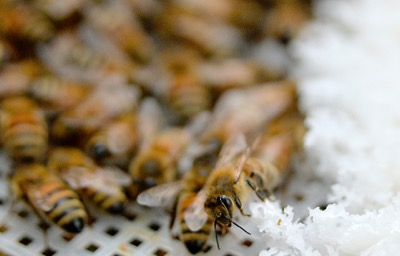
Photo by Dan Melograna/The Daily Standard
Bees feast on fondant recently at the home of Ron and Carolyn Stucke in Maria Stein. The Stuckes feed their bees fondant during the winter as do most beekeepers since bees can eat it immediately rather than having to convert it into honey.







